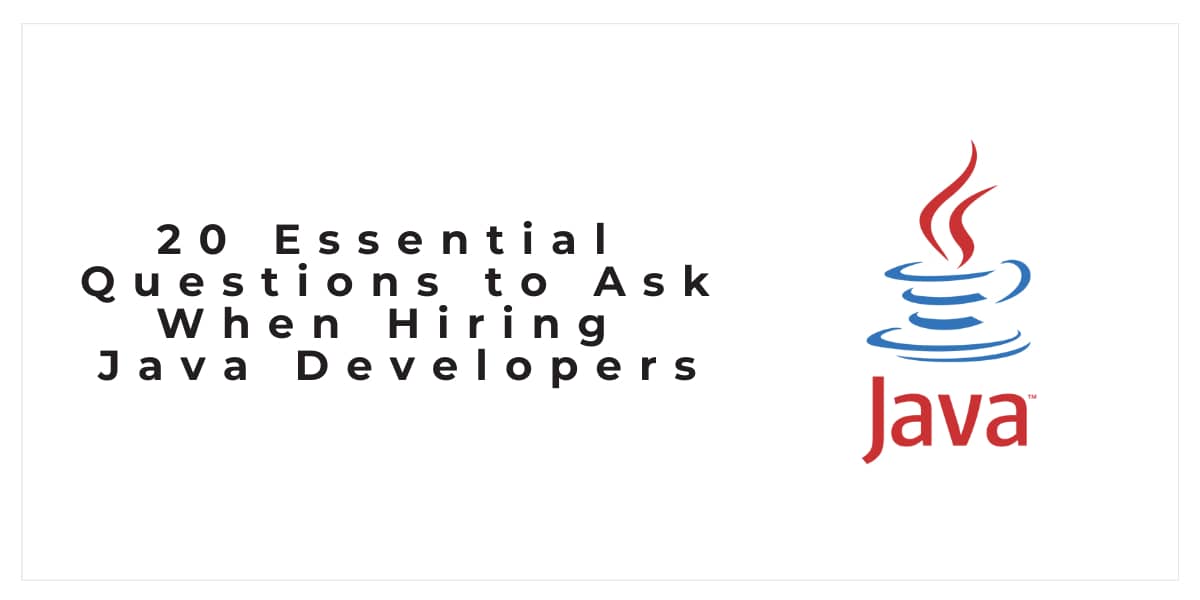About 10,130 companies use Java in their tech stacks. The number speaks for itself. Java has continued to stand tall in the competitive market despite being launched over 25 years ago. However, the increase in technology’s demand is directly proportional to the rise in developers, which poses a real challenge—choosing the right Java developer from this massive pool of developers.
Back in the day, the hiring process focused more on testing the basics of the technology. However, today’s fierce competition demands interview questions to level up. To help you make the hiring process easier, we have listed 20 essential questions you should ask when hiring a Java developer.
Before directly jumping to the questions, let’s examine how taking an online coding test will help you screen a candidate better.
So, let’s get to it.
Benefits of online coding tests
There may be times when there is a mismatch between what a candidate's resume sells and the candidate's in-person. The skills mentioned in the resume To make the hiring process easier and simpler, online tests are a good way to test a candidate's technical skills. A few benefits of these tests include:
- Effectively tests the technical skills of the candidate
- Saves time
- Easily accessible from home
- Makes the overall hiring process more efficient
- Erases bias
- Boosts candidate’s experience
While Java is known for its security and performance, Node.js is a new technology rising today. So be it Java or a Node. js developer, taking online coding tests would help you pre-screen the candidates. Click here for Node.js online tests. Use this test during the technical round of the interview to see whether the candidate has the required technical skills.
Similarly, platforms like TestGorilla have tests for different languages. Candidates can easily take these tests while at home. You can proceed with a face-to-face interview once the candidate clears the test with the required score.
Now that we know the importance of online coding tests let’s start with the interview questions.
1. How to reverse a string in Java without using the reverse method/function?
Although Java's libraries like StringBuffer or StringBuilder come with the reverse() method, there is a way to reverse an array through a simple algorithm.
2. What are static initializers and when do you use them?
A static initializer is a block that executes before the main method in Java. Whether you write it before or after, it will be executed before the main method executes.
3. What is a sleep method in Java? How is it different from the wait method?
The sleep method keeps the shared lock on hold for a certain number of milliseconds. It is majorly used while polling or for checking results at regular intervals. While the wait method pauses the thread until either a certain number of milliseconds, have elapsed, or it receives a notification from another thread. It does not keep a hold on the shared lock/object.
4. What are method references and how are they used?
Method references are only used to replace a single method of the lambda expression. The main benefit of using a single function lambda expression is that it makes a code more clear and short.
5. What’s the difference between a user thread and a daemon thread?
A user thread and a daemon thread may seem similar; however, they are not. When a thread is created in a java program, it is called a user thread. At the same time, a thread that runs in the background and doesn’t prevent the JVM from exiting is a daemon thread.
6. What does the volatile keyword mean in Java?
Volatile is a keyword used with variables. All threads in Java read its value directly from the memory location without caching it. It ensures that the real value is the same as in the memory location.
7. How to use Java’s timer class?
Java’s timer class is a subclass of java. util package. It is used to schedule a thread that will be executed at a certain time in the future. You can schedule a task that can run at a single time or keep running at regular intervals.
8. What causes a deadlock scenario?
When two or more threads get blocked forever waiting for each other, a deadlock occurs. This is when Java’s multithreading feature needs to be coded wisely. Deadlock occurs when multiple threads want the same locks however get them in varying orders.
9. What are functional interfaces and how to create one?
An interface that has only one abstract method is called a functional interface. So they have a single functionality to exhibit. However, it can have a many number of default methods. Below is the code to create one:
interface sayable{
void say(String msg);
}
public class FunctionalInterfaceExample implements sayable
{
public void say(String msg){
System.out.println(msg);
}
public static void main(String[] args) {
FunctionalInterfaceExample fie = new FunctionalInterfaceExample();
fie.say("Hello there");
}
} 10. What does method overloading mean?
It is called method overloading when different methods can have the same name but different signatures. The signatures can vary by the type of input parameters, the number of input parameters, or even both.
11. What is method overriding?
Method overriding happens when a subclass (child class) has the same method as the parent class. In other words, when a subclass provides an implementation declared by one of the parent classes, it is called method overriding.
12. Is empty catch block the right way of coding?
While one can use the empty catch block to code, it is not an ideal way of programming. Also, when we use an empty catch block and if the block catches an exception, there would be no information about the exception. So there should be a long file to log all the exception details so that debugging gets easy.
13. What happens when the main method throws an exception?
Once the main method throws an exception, Java terminates processing the current program and displays the exception message stacked in the system console.
14. How do you write a custom exception in Java?
One can create a custom exception class in Java simply by extending the Exception class (an already existing class) or any of its subclasses. One of the primary benefits of a custom exception is that it can have its own methods and variables which can be used to pass error codes or any exception info to the exception handler.
15. What is memoization?
Memoization is a process that ensures that a function(method) does not run for the same inputs more than once. It keeps a record of the results for the given inputs in a hash map.
16. What is CountDownLatch in java?
CountDownLatch in Java is a synchronizer that enables a threat to wait for another thread/s before it starts processing. Here is when Java’s multithreading feature benefits us since it simplifies the process of development with efficient ram usage.
17. What is Enum?
Enum is a data type similar to a class in Java which is used to create values like East, West, South, North. Essentially, it is a new type whose field includes of fixed sets of constants. It was introduced with Java 1.5 version.
18. Is Java Pass by reference or Pass by value?
This one qualifies to be the most confusing question about this language. Some believe that Java is a pass by reference, while others believe it is a pass by value. However, as per the Java Spec, Java is a pass by value. Everything from passing a variable to a method is through pass by value.
19. What are the features of Java?
Below mentioned are some of the top features of Java:
- Object oriented
- Simple and secure
- Robust
- Portable
- Independent of OS
- Multithreaded
There are many other features of Java. However, these are a few that make Java among the top programming languages for cloud engineering as well.
20. What is OutOfMemoryError in Java?
When the Java Virtual Machine(JVM) runs out of the heap memory, it throws the OutofMemoryError. One can fix this error by freeing more memory to run in the java application.
Wrapping up 20 essential questions to ask when hiring Java developers
Hopefully, you could gauge the questions to ask when hiring a Java developer. While the article covers all technical questions, don’t forget to ask questions focusing on soft skills. After all, you want to hire a team member, not simply a developer. So ensure to have a holistic approach to the interview.
Remember, the candidate applying for the job may be a fresher or an experienced person. It is up to you to filter out questions based on the candidate. The article has a set of mixed questions, some basic and others advanced. Choose them depending on whether you’re filling an entry-level or experience-level position.







